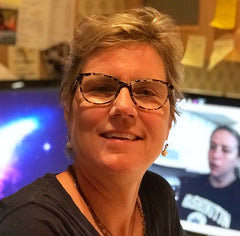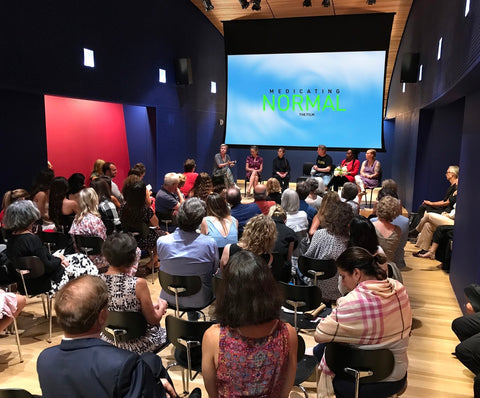

HIGHLY RECOMMENDED - Educational Media Reviews Online | BEST DOCUMENTARY FEATURE - Woods Hole Film Festival | BEST DOCUMENTARY - The People's Film Festival | IMPACT AWARD - Whistleblower Summit & Film Festival
Public Health + Medicine • Psychiatry • Mental Health, Psychology + Counseling • Social Work • Physical Dependency + Prescribed Drug Withdrawal • Suicidology • Human Rights • Crisis Intervention
Date of Completion: 2020 | Run Time: 54 & 76 minutes | Language: English with English & Chinese subtitles | Captions: Yes | Includes: Transcript & Discussion Guides | Directors: Lynn Cunningham & Wendy Ractliffe | Producers: Lynn Cunningham, Wendy Ractliffe & Muffie Meyer
One in five Americans takes one or more commonly prescribed psychiatric medications on a daily basis. While these drugs can sometimes provide effective relief, they are prescribed far too often, frequently without discussing with patients the possible alternatives and potential adverse outcomes, both physical and mental. MEDICATING NORMAL follows five people who are harmed by the very medications they believed would help them. It is the untold story of the serious consequences that can occur when market-driven medicine intersects with human beings in distress.
Educational Media Reviews Online (EMRO) | Bryan J. Sajecki, University at Buffalo
Highly Recommended "Medicating Normal is an incredibly interesting film for any academic library and acts as a warning to be more aware of what people put in their body. Old advertisements from drug companies are juxtaposed with pertinent longitudinal statistics and information from medical experts and real-life stories. Its themes of mental health, psychology, and the pharmaceutical industry are hot button topics for the classroom. In addition to the film, there is an accompanying discussion guide for instructors."
University College London | Joanna Moncrieff, Professor of Critical and Social Psychiatry
“Medicating Normal is a powerful and moving film about the damage that is done by the inappropriate medicalisation of human predicaments and the reckless prescribing of psychiatric drugs. The film reveals the harm done to its subjects whose lives were derailed by prescribed medicines, and it shows the courage and determination it took to get off the drugs. Watch it and weep for all the others who have been harmed in this way-I did!”
The University of British Columbia | Thomas L. Perry, Clinical Assistant Professor
“Anyone who prescribes psychotropic drugs should watch Medicating Normal, not once but twice. Then think about whether your patients really ‘need’ drug therapy. What are the chances it will help more than harm? A little knowledge may be a dangerous thing, but this film should cause many to wonder whether patients know more about the drugs than most prescribers.”
Stanford University Medical Center | Anna Lembke, Associate Professor of Psychiatry and Behavioral Sciences
“Medicating Normal dares to challenge prevailing myths about how psychotropic medications work, or fail to, in our ongoing struggle to treat mental illness. It promises to spark a long-overdue national conversation on the growing problem of overprescribing.”
University College London | Mark Horowitz, Psychiatry Trainee & Clinical Research Fellow
“Most psychiatrists know that the studies on which our drugs are approved last just a few weeks. Therefore, we have all, in a quiet moment, asked ourselves, ‘What is the effect of putting people on these drugs for years or decades?’ Medicating Normal is a powerful film that answers this question in a disturbing and eye-opening way. This film should be mandatory viewing for prescribers, patients and their family members. It is a sober redress to the pro-Pharma messaging so prevalent in our society."
Texas Tech University School of Medicine | Rakesh Jain, Clinical Professor
"Even as a persnickety psychiatrist, I find this documentary to be hugely beneficial as a conversation starter on this important topic. Not everyone will come out of it agreeing with all it says, but I can guarantee it will provoke additional thinking in every clinician, and perhaps even create a shift in our thinking and action on the issue of medication prescribing in America."
Case Western Reserve University | Awais Aftab, Clinical Assistant Professor of Psychiatry
"Medicating Normal is a remarkable documentary that illustrates how conversations about the harms of psychiatric medications have entered the public realm. In response to the failure of the medical system to adequately acknowledge these harms, ex-patients/survivors are taking ownership of their psychiatric distress and addressing it on their own terms. These are complex issues and there are no easy answers; the strength of Medicating Normal is that it boldly initiates a societal discussion that has been long overdue.”
Video Librarian
"Ultimately, the message is to be a more informed patient who understands the side effects and long-term impact that taking any prescription medication can have on an individual ... Highly Recommended."
Booklist
"Each tells his or her story, painfully describing the increased symptoms from increasing medications and the pain of withdrawal. Psychiatrists, doctors, and scholars add their commentary. This is sure to start discussions about these medications and their varied impacts."
AWARDS
Best of Fest and Best Documentary Feature | Woods Hole Film Festival
Virtual Audience Award 2021 | The Magnolia Independent Film Festival
Audience Award and Best Documentary | The People’s Film Festival
Impact Award | Whistleblower Summit & Film Festival
Audience Favorite Feature | Docutah International Documentary Film Festival
FESTIVALS
Whistleblower Summit & Film Festival
Durango Independent Film Festival
Santa Barbara International Film Festival
Sedona International Film Festival
DC Independent Film Festival
Through Women's Eyes International Film Festival
Greenwich International Film Festival
Minneapolis St. Paul International Film Festival
Woods Hole Film Festival
The People's Film Festival
Richmond International Film Festival
ChangeFest
REEL Recovery Film Festival
DocUtah International Film Festival
Trauma Research Foundation Winter Film Festival
Director & Producer of MEDICATING NORMAL

Award winning filmmaker, and co-director/producer of MEDICATING NORMAL, Lynn Cunningham produced, directed and edited films/TV for PBS and the History Channel in the 1980s and 90s (A Quiet Revolution: The Emergence of Alternative Education in Japan; Twenty Years of Co-Education; A Family in Progress; An Innovator’s Story, Behind the Scenes, Walter Reuther & the Birth of the UAW, Tadao Ando, Butoh: A Body on the Edge of Crisis, etc).
Twenty years ago, as she was becoming a parent herself, Lynn witnessed with crushing despair the dramatic transformation of a beloved family member. Once a bright, high functioning scholar/athlete having graduated from an elite college, Lynn’s relative had become in a few short years — a terrified, suicidal shell of her former self — diagnosed with serious mental illness. Putting their faith in the best psychiatric standard of care at the time in the late 90s, Lynn and her family were initially reassured by the relief and stability provided by medication and therapy. After a ten-year period, however, one medicine had become ten, and income from a vibrant, self-sufficient career was replaced with monthly disability payments. Unable to provide an answer to her relative’s persistent self-doubt, “Is everything going to be OK?” Lynn began searching for answers. She joined with her filmmaking partner Wendy Ractliffe, embarking on five years of research into the complex world of mental health treatment. After discovering Robert Whitaker’s Anatomy of an Epidemic, they interviewed 100s of psychiatric patients and consulted with scores of experts across the country about their experiences. A personal quest to help one suffering individual turned into a mission to tell an untold story. In Medicating Normal, Lynn and Wendy began to piece together a stunning new perspective on the safety and efficacy of psychiatric drugs and society’s over reliance on them to relieve pain and suffering.
REQUEST A GOOD TALK CUSTOM PANEL
 GOOD DOCS and the MEDICATING NORMAL outreach team offers assistance in creating a customized post-screening panel. Panel discussions generally run 45 minutes to an hour and can include a filmmaker, a subject in the film, and 1-2 additional individuals depending upon audience needs and interests. We offer a curated and extensive list of potential panelists that includes researchers, clinical pharmacologists, pharmacists, psychiatrists, psychologists, physician assistants, trauma therapists, parents, lawyers, science journalists and others. Post-film discussions have been broadened by including the voice of at least one individual whose life has been impacted by psychiatric drug treatment, many of whom are medical professionals themselves.
GOOD DOCS and the MEDICATING NORMAL outreach team offers assistance in creating a customized post-screening panel. Panel discussions generally run 45 minutes to an hour and can include a filmmaker, a subject in the film, and 1-2 additional individuals depending upon audience needs and interests. We offer a curated and extensive list of potential panelists that includes researchers, clinical pharmacologists, pharmacists, psychiatrists, psychologists, physician assistants, trauma therapists, parents, lawyers, science journalists and others. Post-film discussions have been broadened by including the voice of at least one individual whose life has been impacted by psychiatric drug treatment, many of whom are medical professionals themselves.
This customized option is highly recommended based on deep and rewarding discussions in over 130 post-screening panels completed thus far.

